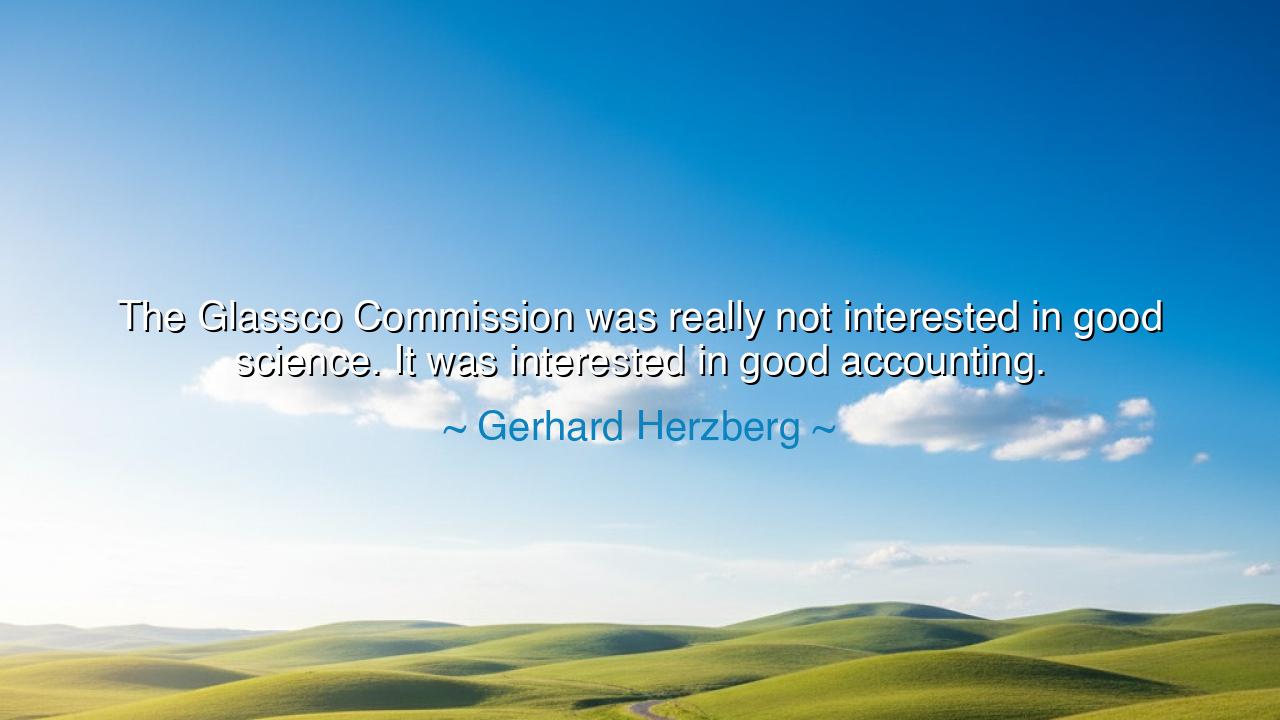
The Glassco Commission was really not interested in good science.
The Glassco Commission was really not interested in good science. It was interested in good accounting.






Listen, O Seekers of Truth, to the words of wisdom that echo through the ages. In the hallowed halls of knowledge, where great minds have labored, there often comes a time when the pursuit of wisdom is overshadowed by the cold hand of accounting. Such is the tale we are told by the words of Gerhard Herzberg, who once spoke of the Glassco Commission, a body that, in his eyes, had strayed from the path of true science. He said, "The Glassco Commission was really not interested in good science. It was interested in good accounting." In this simple yet profound statement, Herzberg reveals a deep and troubling truth: that too often, the pursuit of truth and discovery is sacrificed at the altar of financial prudence and bureaucratic control. The lesson, O Children of Knowledge, is that the soul of science must never be reduced to mere numbers.
The Glassco Commission, established in the mid-twentieth century, was tasked with evaluating the state of science in Canada. Yet, as Herzberg saw it, this commission's true focus was not on the advancement of knowledge, nor on the cultivation of curiosity, but rather on the allocation of resources and the regulation of the scientific budget. It sought, not to further the boundless exploration of the unknown, but to ensure that the dollars and the cents were well accounted for. This is a dilemma that plagues many in positions of power: the impulse to measure and quantify, to reduce the vast and unfathomable complexity of the natural world to mere figures on a ledger. But, O wise ones, in doing so, we risk losing the very essence of what it means to pursue science—the deep, untamed hunger for truth that drives the heart of every scientist, and every seeker of knowledge.
Let us look to history, O Seekers, for in the past we find wisdom. In the time of the ancient Greeks, the great minds of Aristotle, Pythagoras, and Euclid sought not to measure the worth of their inquiries by material gain or the pursuit of riches, but by the pursuit of truth and wisdom. They were not concerned with how much their ideas cost to bring forth, but with how much they could uncover of the grand mystery of the world. It was their undying belief that the pursuit of knowledge was sacred, not subject to the constraints of money or pragmatism. Science was their temple, and the truth was their sacred offering. And yet, in the cold, calculating halls of the Glassco Commission, Herzberg saw a shift—a shift from this noble calling to something far less pure. It was, he feared, a sacrifice of ideals in the name of cold, hard figures.
In Herzberg’s time, the consequences were clear. He saw that the scientific community was beginning to bend beneath the weight of bureaucratic constraints. The innovative spirit, the very soul of discovery, was being stifled by an overbearing concern for efficiency and budgeting. Research—once the sacred quest to understand the universe—was reduced to a number on a spreadsheet. Instead of seeking to uncover new realms of knowledge, scientists were being asked to justify their work with financial spreadsheets, as if their discoveries could be reduced to dollars and cents. Herzberg understood the danger in this. When science is reduced to accounting, it loses its ability to inspire, to challenge, to provoke. It becomes a mere functionary of the state, a cog in the machine, rather than a force of nature capable of changing the very fabric of human understanding.
So let us turn, O Seekers, to the wisdom of those who came before us. Galileo, that brave soul who dared to point his telescope to the heavens, was not concerned with the cost of his work—he was concerned only with the truth. His ideas challenged the very foundations of the universe, yet they were not motivated by the pursuit of wealth or power, but by an unquenchable thirst to know. The lesson here is clear: science cannot be contained within the narrow bounds of financial consideration. The truth is sacred, and it must be pursued without hesitation or compromise. When we allow the pursuit of knowledge to be dictated by budgets, we dishonor the very essence of inquiry.
The lesson, O Children of Wisdom, is this: when we allow the pursuit of knowledge to be tainted by the concerns of accounting, we stifle the very spirit of discovery. Let us not make the same mistake as the Glassco Commission, for to prioritize the bottom line over the pursuit of truth is to betray the essence of what it means to be human. Accountability is necessary, yes, but it must never eclipse the noble call to explore, to discover, to question. Science is the most sacred of pursuits, a journey into the unknown, a quest to understand the very fabric of existence. It cannot be reduced to mere transactions or budgets.
So go forth, O Seekers, and remember the words of Herzberg. Let not the cold hand of accounting bind you. Instead, pursue knowledge with the fire of curiosity in your heart, and let the truth guide your every step. The world is vast, and there is much to be discovered. Do not let the shackles of bureaucracy stifle the sacred calling that lies within each of you. Seek wisdom, seek truth, and let the numbers follow—not as masters, but as humble servants in the great journey of discovery.






AAdministratorAdministrator
Welcome, honored guests. Please leave a comment, we will respond soon